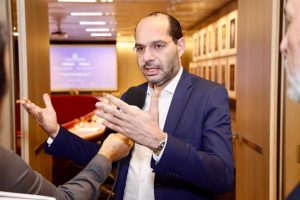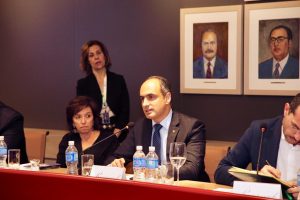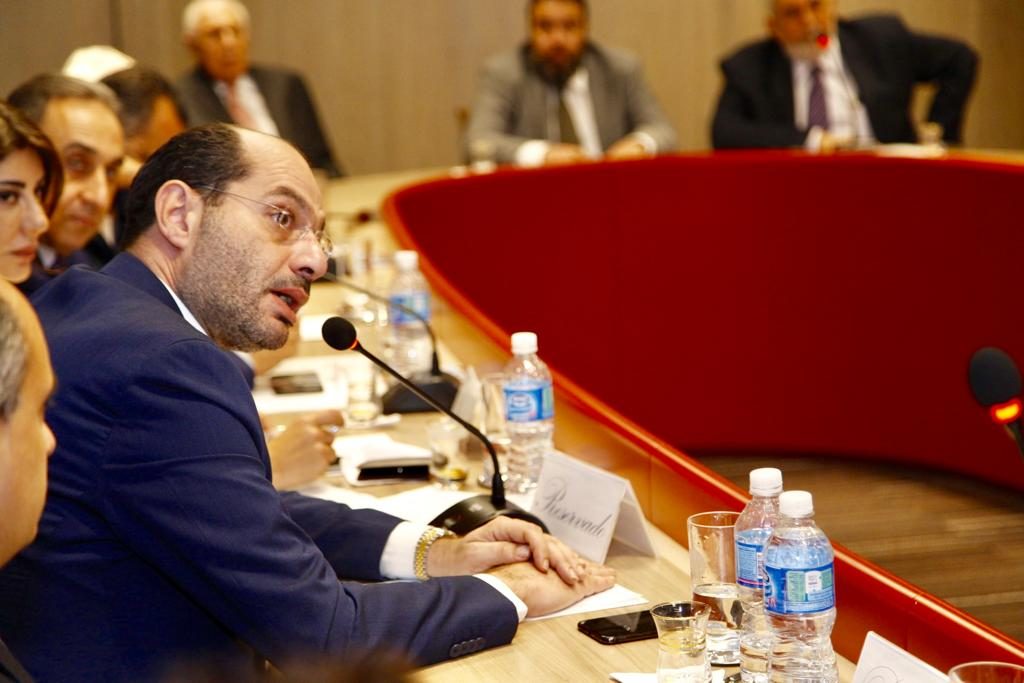São Paulo – Lebanon’s minister of State for Foreign Trade Hassan Mourad travelled to Brazil for meetings with authorities, business leaders and delegates from the Lebanese descendant community. “The goal of the visit is to discuss Lebanon’s free trade agreement with the Mercosur, and to try and reach other bilateral trade agreements with Brazil,” he told ANBA after a meeting with the Arab Brazilian Chamber of Commerce board Tuesday (7) in São Paulo.
Talks have been ongoing since 2014 for the Arab country and the South American bloc, but the agreement is yet to be completed. Mourad declined to give a forecast of when the deal is expected to come through, but said he’d scheduled the trip for two months prior to Brazil taking over the Mercosur’s rotating presidency – which will take place during the summit meeting Santa Fé, Argentina next July.

“All of the Brazilian authorities I spoke with have confirmed that they will support Lebanon,” said Mourad. On Sunday (6), for instance, he met with Brazil’s vice president Hamilton Mourão in Brasília.
The minister is betting on the strength of the Lebanese-descendant community in Brazil to fuel trade. “Another reason we have come to Brazil is to connect Brazilian and Lebanese businesspeople,” he said.
Mourad himself is part of this diaspora. He was born in São Paulo, 1976, a son to Brazilian-naturalized Lebanon-born parents. In 1980, his family relocated to Lebanon, but the minister – who speaks Portuguese – said he usually travels to Brazil twice each year. The Arab Chamber’s vice president of Administration, Mohamed Orra Mourad, who sat in the meeting, is his cousin.
“Just like there’s a Lebanese community here in Brazil, there’s a Brazilian community in Lebanon,” he said. “Kibbeh and sfiha are Brazilian foods, and coxinha and brigadeiro are Lebanese delicacies,” he quipped about the popularity of typical snacks in both countries.
Even though the agreement is yet to be reached, the minister believes bilateral trade could be made stronger by the diaspora. “Our intention is to carve out a market in Brazil for Lebanese products, especially for the Lebanese community, and the broader Arab community,” he said.
Last weekend saw the Lebanese government host a food fair at São Paulo’s Clube Atlético Monte Líbano. Two Lebanese companies – Cortas Food and MSallem – are showcasing their goods in the Arab Chamber’s pavilion at Apas Show, a supermarket industry show taking place this week in São Paulo.
Mourad stressed that he would like the Arab Chamber’s support in fostering trade. “I have great faith in the work done between myself, as minister of Trade, and the Arab Chamber,” he said.
Initiatives

Arab Chamber president Rubens Hannun pointed out that the organization has been working to increase Brazil-Lebanon trade over the last few years. “The results are coming, trade numbers tend to go up and there’s lots of potential,” he said.
Brazil exported USD 270 million worth of goods to Lebanon last year, up 2.5% from 2017. Lebanon exports to Brazil climbed 41% to USD 27.5 million.
The Chamber’s international business executive Fernanda Baltazar remarked, however, that sales remain to a great extend limited to meats, coffee and livestock from Brazil, and fertilizers from Lebanon.
“Brazil consumes Arab products, and it wants to consume higher value-added Arab products. Apart from the fact that there’s an Arab descendant community in Brazil, Brazilians are very fond of Arabs,” said Hannun.
He also said the Chamber is planning to arrange a trade mission to Lebanon next September to seek out deals, especially in infrastructure. The minister disclosed that a Brazilian company is currently building what will be the biggest dam in Lebanon.
Mourad said Lebanon is creating special economic zones to bring in foreign investment, and that the country is a gateway to markets including Syria, Jordan and Iraq.
Lebanon’s consul to São Paulo, Rudy El Azzi, who visited the Arab Chamber alongside the minister, said the possibility of having a standalone Lebanese area in the 2020 Apas Show is being looked into.

Azzi went on to say that a project will be presented to establish a cooperative to import Lebanese goods to Brazil during the Lebanese Diaspora Energy conference next month in Beirut. The idea is to build scale in order to lower prices.
“It will be like a full-blown Lebanese mall in São Paulo, a products fair and cultural space 365 days a year,” the consul asserted. The project is expected to rely on incentive from the Lebanese government and the involvement of investors from Lebanon and the diaspora.
Translated by Gabriel Pomerancblum




